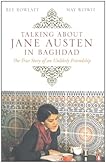 Talking about Jane Austen in Baghdad: The True Story of an Unlikely Friendship by Bee Rowlatt
Talking about Jane Austen in Baghdad: The True Story of an Unlikely Friendship by Bee RowlattMy rating: 4 of 5 stars
The book's title is slightly misleading, as there is barely any talk of Jane Austen or literature for that matter. It contains nothing but a three year long exchange of emails (upto October 2008) between two women in opposite ends of the world, one an Iraqi English literature professor (May) in Baghdad and the other (Bee) a journalist with the BBC in London. It seemed dull at first, and as my sister put it when she read the book, intrusive, as though you were violating the women's privacy by reading their personal emails.
But then you get caught into their lives by witnessing the blossoming of a true friendship and the bond that develops between them, and you're struck by the stark contrast of their lives.
In almost every email, May talks about death, insecurity and instability in the city after the US invasion but never fails to add words of love to her 'sister' (Bee) and her 'nieces' (Bee's daughters) and her longing to see them. Bee, on the other hand, talks about the joys and trials of motherhood, her work and her husband while asking probing questions as to life in Baghdad before and after the US invasion, May's work and her students, her husband's family and Islam, while at the same time offering comforting and compassionate words to ease May's troubles. What I liked a lot about the book is that May answers Bee's questions intelligently and honestly, helping dissipate any stereotypes the reader may have about Islam, by firmly establishing the fact that Islam and tribal law, (the latter which governs most regions in Iraq) are completely separate of each other, even though most people consider them to be synonymous.
You're also struck by the strength of the Iraqi people who having been subject to so much adversity for the past 30 years, still stay rooted in their faith, traditions and culture despite the curfews, bombs and bullets.
In the face of May's trials, Bee's complaints of her daughter's 'weeing' may seem trivial but I think it is the normalcy of her friend's emails that strikes a chord with her, helping her to get through her daily routine. Similarly, the sadness of some of May's emails touches Bee and she realizes how small her afflictions are in comparison and attempts to do everything she can to get May and her husband out of Iraq.
I would have loved to read more about May's classes in the university and her teaching methods, but all in all it's a good read, if you can bear to read May's horrifying (some eye-witness) accounts of the terror reigning in Baghdad. You really feel for the civilians living there stuck in the inferno and wonder how people can be so merciless to their fellow human beings, for no reason whatsoever except for a difference in faith or political opinion.
View all my reviews